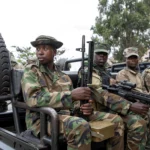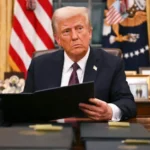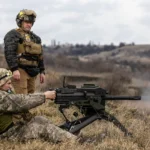Russian president Vladimir Putin is facing an economic nightmare as the nation struggles to continue to fund his war effort in Ukraine.
Soaring food prices and depleted war resources have seen the Kremlin attempt to strike a balance between maintaining the war machine in Ukraine whilst ensuring domestic stability.
Currently, a kilogram of potatoes is at least 73% more expensive than at the start of the year, while the price of butter has increased by more than 30%, according to data released by the Federal Statistics Service on Thursday.
Russia had already experienced rising food prices before this years surge, as Western sanctions, including restrictions on imports, increased the price of staple items including milk, bread and fish.
Other areas have been hit too, with a 64% rise in inflation, mortgage rates rising to more than 28% and interest rates reaching a record high of 21% last month.
Russian Prosecutor General Igor Krasnov has ordered an investigation into price increases and has pledged to provide a response to placate growing public disquiet.
Deputy Prime Minister Dmitry Patrushev has also acted and demanded a daily monitoring of the food market and measures to stabilize the situation.
Additionally, the Kremlin recently adopted several policies that aim to cut Russian government spending on wounded Russian servicemen, combat inflation, and address long-term demographic problems such as low birth rates and labour shortages.
The cuts, which will see the one-time payment made to those injured in combat cut significantly, was met with anger by Milbloggers online, with Putin eventually compromising on the amount cut.
At the outbreak of the war, those injured in combat would receive around £24,000 but this will now only apply to those with the most severe injuries, something which Milbloggers claim is becoming increasingly hard to have recognised by the medical authorities.
The Institute for the Study of War said: “Financial incentives became the key pillar of the Russian military’s recruitment campaign and personnel retention efforts over the past nearly three years, and the reversal of such incentives indicates that the system is becoming economically unsustainable for the Kremlin.”
At the outset of the Ukraine war, the unprecedented levels of sanctions placed on Ukraine led many to hope that the Russian economy would be crippled, thus forcing them to negotiate for peace or withdraw altogether.
That is yet to happen, with the Russian economy proving more durable than expected, thanks in large to Russian allies such as China and North Korea.
But as the war enters the winter of its third year, there is genuine hope amongst Western economists that Russia’s financial woes are beginning to become significant to the extent that a tangible could soon be seen on the country’s war effort.









BWER delivers robust, precision-engineered weighbridges to businesses across Iraq, combining state-of-the-art technology with local expertise to support infrastructure and logistics growth.
Hey very cool website!! Guy .. Beautiful .. Superb .. I will bookmark your blog and take the feeds additionallyKI am glad to find so many helpful information right here in the publish, we need develop extra strategies on this regard, thanks for sharing. . . . . .